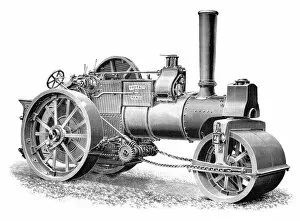Traction Engine Collection (#4)
In the early 20th century, the sight of a traction engine was a marvel to behold
For sale as Licensed Images
Choose your image, Select your licence and Download the media
In the early 20th century, the sight of a traction engine was a marvel to behold. One such magnificent machine was the 1921 Burrell Earl, which played a vital role in steam threshing in 1931. Its power and efficiency were unmatched as it tirelessly worked its way through fields, separating grain from chaff. A long run from Tarland, Aberdeenshire, necessitated a thorough clean-up for this 1925 beauty before it embarked on its journey. After bringing his steam engine, Hielan Laddie, all the way from Aberdeen to Dorset's Blanford for The Great Dorset Steam Fair, its owner couldn't help but admire its gleaming exterior. On June 13th, 1958 Popeye himself got into position for the traction engine rally at The Great Dorset Steam Fair. It was an event that brought together enthusiasts and collectors who marveled at these mechanical wonders. One particular collector with an impressive assortment of traction engines was Mr Jack Wakefield of Hetton-le-Hole. His passion knew no bounds as he meticulously maintained each piece in his collection. The versatility of these machines extended beyond threshing crops; they could also be used as steam rollers like Bess. On April 21st she rolled her way through Mitford sawmill with precision and grace. Even caravans recognized the power and grandeur of these engines as they arrived at their destination on MCF01_02_1063. Their occupants eagerly awaited the spectacle that lay ahead. But perhaps one of the most awe-inspiring moments involving a traction engine came when GREAT PAUL: THE NEW BELL FOR ST rang out across England's countryside. This majestic machine showcased not only raw strength but also served as a symbol of tradition and history. From their humble beginnings to becoming icons of industry and innovation, traction engines left an indelible mark on our past.



